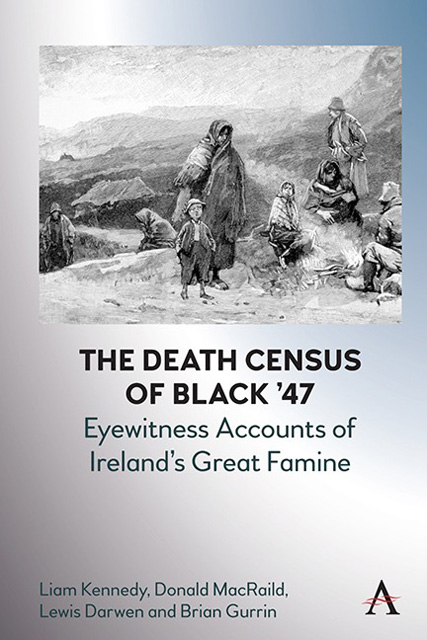Chapter Three - The Politics of Famine Mortality
Published online by Cambridge University Press: 17 October 2023
Summary
On 5 April 1847 John O’Connell announced at a regular meeting of the Repeal Association that steps were being taken to ‘procure a census of deaths which have occurred and are occurring in Ireland from starvation’. He continued:
The secretary has received instructions […] to address the Catholic clergy, and other influential individuals, who have local knowledge, requesting that, as far as is consistent with the discharge of their most onerous duties, which have been greatly increased by the famine, they will furnish us with the means of presenting to the world the appalling loss of human life in our unfortunate country, which has occurred in consequence of the misgovernment of England in former times, and which her present legislation falls far short of remedying.
O’Connell had recently assumed the role of de facto leader of the Repeal Association. The organisation had been formed in 1840 by his father, Daniel, and enjoyed widespread support at both national and local level. Shopkeepers, priests, and other professionals filled the local leadership roles. While the elderly O’Connell remained the unchallenged figurehead of the Repeal movement, declining health impaired his effectiveness and in early 1847, sick and weary, he embarked on a pilgrimage to Rome. The ‘Liberator’, as he was known to his faithful followers, died en route at Genoa, Italy, in May 1847, aged 71. True to the principle of dynastic succession – a deeply ingrained feature of Irish life – his son John took control of the Association.
The case for a Death Census, as John O’Connell's pronouncement makes clear, locates it within both the immediate crisis of the Great Famine and the longer-term demand for repeal of the Act of Union of 1800. Its genesis was, therefore, deeply political, and drenched in criticism of the British parliament. John's stated intention was to reveal to the world the terrible events unfolding in Ireland, and reflected his view that many people in Britain, including most MPs, were failing to recognise the severity of the crisis. This was despite the fact that the O’Connells and other Irish MPs had been informing parliament about the Irish situation for the best part of a year.
- Type
- Chapter
- Information
- The Death Census of Black '47Eyewitness Accounts of Ireland's Great Famine, pp. 39 - 54Publisher: Anthem PressPrint publication year: 2023



